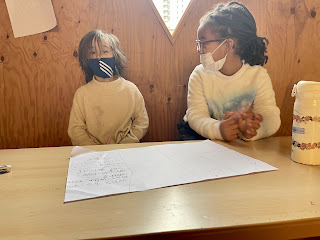"Students should QUESTION ANSWERS as often as they ANSWER QUESTIONS."
As a provocation, we started and read this statement together...
Then there were complains and groans,
"My head is hurting Ms. Faye!"
"Huh? What?"
"I don't understand."
Then that's the start of the whole idea about QUESTIONS.
What are BIG and small Questions
BIG QUESTIONS
...a question that makes you think
...makes you ask another question.. and another.. and another
...a question that has many answers
...it is difficult to answer
small questions
...are easy questions
... you can answer with just a yes or a no
... specific answer
Then, the Perky Preschool worked with a group and came up with questions that they would like to ask each other. They asked about their childhood, family, and ideas about places and time.
They wrote down their questions.
It is amazing to see how they have matured and is able to collaborate better with each other. They have also progressed and they can write on their own!
The questions were then compiled, printed and cut into strips.
The students sorted the questions whether it is big or small question.
To end the week, they came up with their 'Wonderings' about our new unit.
Here are some questions..
"Why do we need to be where we are right now?"
'Why do we have to grow?"
"Why do we need to be together with our family?"
"Why do we need transportation?"
"Why do we need roads."
"Why do people make mistakes and say it is fine?"
'Why do things change (just like colors, people)?"
"Why do people make buildings?"
"Why do we have to live on earth."
Whew! Why do they have so many questions? 😅
NUMERACY
The students continue to explore place value. They used base ten blocks to represent numbers from 1-99. This exercise helps the students identify how many tens and ones there are in a number.









Comments
Post a Comment